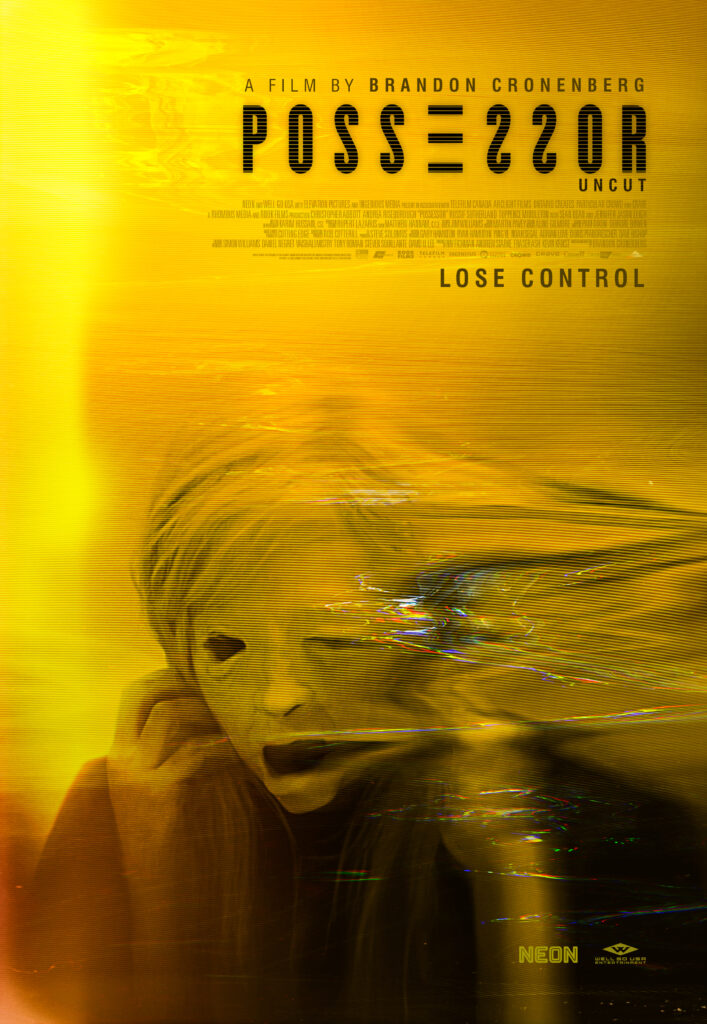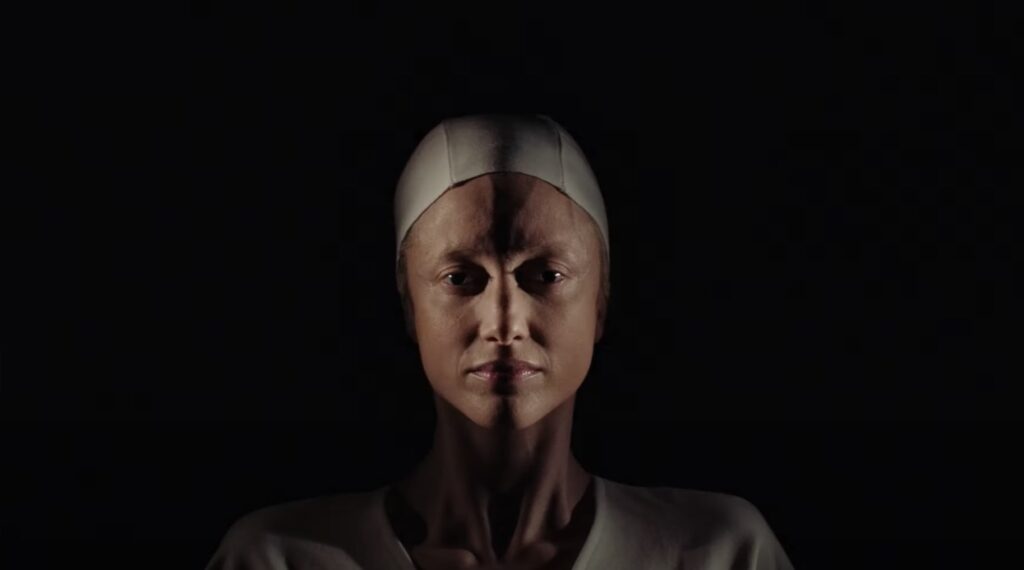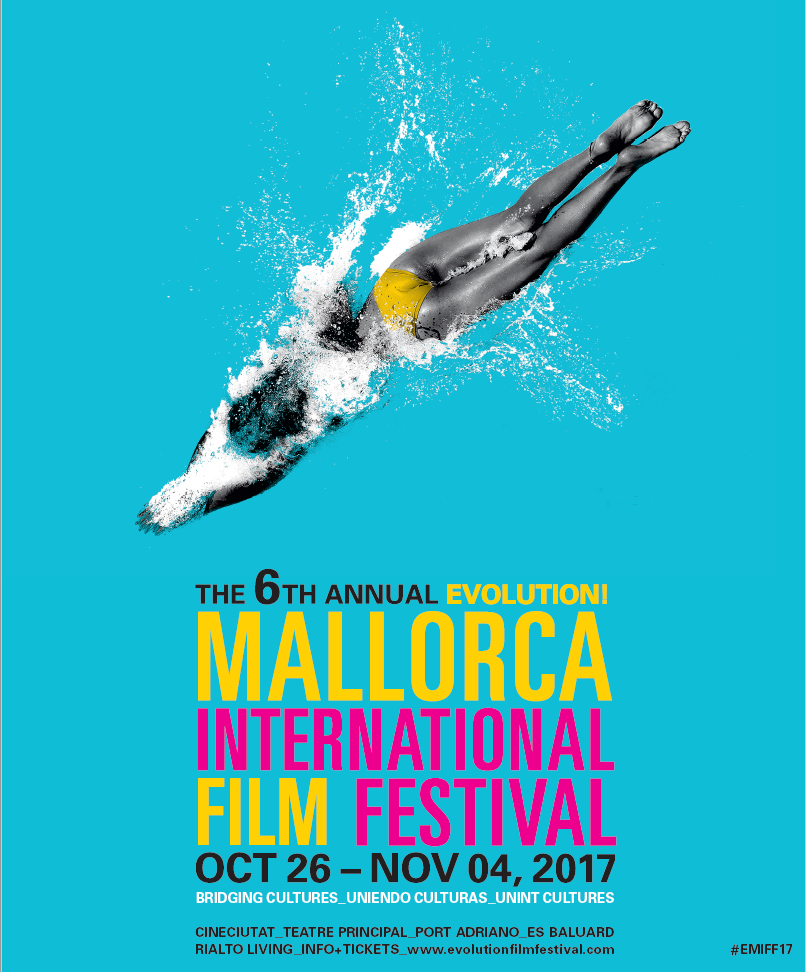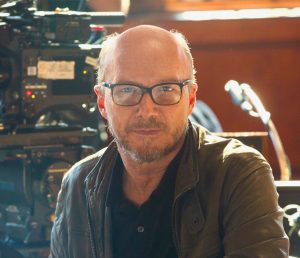Director Wes Anderson hits Cannes this year with ASTEROID CITY. The all-starrer work promises to be typical Wes complete with quirky characters, jelly bean production values and off kilter storyline.

Cannes Film Festival starts May 17th.


During a partial lockdown my only entertainment is sitting in the living room in front of a screen. I got a screener link to Possessor. I knew a few details about the film from social media. The jarring one sheet poster meant this is a not a mainstream film.
Brandon Cronenberg is an apple who did not fall from the tree. Like his father, the son of acclaimed filmmaker David Cronenberg displays his cynicism towards modern technology front and centre. To classify the film as just a sci-fi thriller would be too easy. Identity, corporate assignation, gender roles, murder and personality theft are covered in Possessor.

I expected some head turning moments when the opening credits rolled. The “what have I gotten myself into moment” started during the first 5 minutes. The shocking opening scene gives a bloody preview of things to come. For Cronenberg fans, as I said, Brandon inherited his father’s artistic DNA.
Kudos to lead actors Andrea Riseborough and Christopher Abbott for playing their synchronized roles without sharing a scene. As Tasya Vos, Riseborough’s breathes life into her almost out of control tech assassin. Abbott’s role as a possessed displaced person in his own body takes a subtle route of a confused man battling for control of his mind and body.

A lot of mention has been given to the film’s cinematography and direction, well deserved. Brandon’s work is one of a confident director in control. At times the emphasis on style over story hobbles his script, especially 3/4 along the ride. A bit of overkill creeps in.
Director of Photography Karim Hussain’s camera work deserves mentioning. One of main criticism of modern technology is the sense of belonging while in isolation. Karim gets this across by shooting the scenes with a sense of chilling detachment.
Possessor can be called “disturbing”. But for me, I would argue this is a calling card work from a guy with a flair for staging violence. Brandon Cronenberg may not get invited to make a Marvel film. That could be a good thing. We need filmmakers with his perspective working outside the commercial arena.
3.5 out of 5 stars.
Possessor, directed and written by Brandon Cronenberg
A Running Time of 103 minutes
From Neon
Available on Video on Demand December 8th
We decided to profile Mr. Reeves for the first performer profile. Why? We like his movies. After 35 years in the business, he continues to be relevant.
Dealing with bureaucrats with artistic pretensions is a balancing act. On the one hand they crave the hell with life mentality of Fassbinder, the go your own path of a Bowie, the respectability of Nolan mingled with the steady monthly salary of a state tax officer. Nowhere do I see this more than at the Berlinale Film Festival.
After the release of the 2017 petition calling for an overhaul of the film festival I saw many of the artistic and bureaucratic emotions collide. Artist and bureaucrats have thin skin. I experienced as well as witnessed the staffs defensive sensitive side during the press screenings, the shorten opening press conference, then at the festival.
Having attended the festival for many years, I support the annual event and films. The Berlinale mixes mainstream cinema to the quirky to the “I Don’t Get it!”
My criticism of the organization has not been any harder or meaner than the any other site or press outlet. As an attendee, I stated the reality. Real change has to come on all levels if it is to stay relevant on the circuit. As the film world knows, the Berlinale has been beset by criticisms from all sides. Festival Head Kosslick resigns this year. After last year’s fest and more recently during a “Chat Cinema” podcast we restated our opinions. A complete redo needed if the Berlinale can gain footing on the level as Cannes, Venice, and Sundance festivals.
I applied for festival access as press, no response. After a quick call, the reply on the other end, “We will check on it.” Then a declined notice via email. Never a problem in the past, all of a sudden a problem. Should I call a CSI team to solve the case? A small website critical of the fest, suddenly there is no space for attendance, press credentials denied for Black and Paper. I was told the press team is being diligent this year. What was their working method in the past?
After speaking to the press team concerning the declined noticed, they mentioned my YouTube features, it felt like they used it as a homework assignment. The numbers were low and the long videos. The reasoning made no sense: the number of seats limited. A drop in attendance the previous year meant there should be more places in 2019, simple math.
I asked, if the staff is so Internet Savvy why did not they not see the 24 pictorial, written, and video features produced and published about the 2018 Berlinale festival posted on Black and Paper.com. Additionally, there could have been more features had we written about the films not liked. Instead I decided to focus on the films liked.
After sending 10 weblinks from the 2018 coverage, I called the press officer back asking if they wanted more proof. I am so important the response was,” we are discussing it, it will take a few hours to discuss the application.” To be the topic of discussion at a film festival by staff should inflate the ego. Instead it feels sad on this side of petty. Did the Chat Cinema Podcast cause this relationship breakdown? I was smugly told we did not have time to listen to the long cast. I had time to endure screening 40 or so films at the film festival, only a few worth processing at a negative lab.
Can you work for another magazine, was a question from the officer. I responded with a “NO!” This site has been ok for me. I’m listed in the Berlinale data base, receiving emails from the festival.
My advice, put together a good festival that engages, not sermonises. Or develop thick skin.
Waiting a “few hours” from 1 pm until 7:48. I posted on Twitter a Chat Cinema tweet. Finally, 54 minutes later an email sent from the Berlinale press office stated my accreditation declined, again. REALLY! The press team spent 7 hours discussing Black and Paper, an honor in a way, the center of attention of a festival with over 400 films, thousands of attendees and we were singled out. A rejection letter that took an afternoon to write. There is an saying in the American South, “If people are talking about you, you must be relevant.” “But if they tell you not to come, you must be really relevant!”
Black and Paper will not attend the Berlinale 2019 because we stated our opinion. By and large not suffering from FOMO Syndrome.
The Berlinale is in a Crisis. What does our creative colleague David Mouriquand think? Click on the link: http://www.exberliner.com/features/opinion/we-need-to-talk-about-the-berlinale/


Black and Paper exclusive interview with Evolution Mallorca International Film Festival Creative Director Sandra Seeling.
Would you say filmgoers are looking for different stories and narratives?

In my experience as a festival programmer, filmgoers want to be surprised and inspired. They want to be taken out of their daily routines and experience new adventures and new point of views.
As a woman, why do you think there are so many challenges for women to direct films?
Women do not get the same opportunities as men. As a woman, we are instantly thought of as less capable, emotional and not as efficient. Unfortunately those attributes are deeply imbedded into the male think pattern (not only in the film industry) and make it harder for women to even get the chance to prove themselves. The challenge also lies in the century long history of the film industry. We as women have to simply keep pushing forward, to do an exceptional job, stand together, and support each other.

Why did you choose Paul Haggis this year as an honoree?
Paul is an incredible social justice advocate and his vision fits really well with EMIFF’s mission; BRIDGING CULTURES – BRIDGING PEOPLE. His work as a filmmaker and humanitarian makes him the perfect recipient for the Evolution Vision award, an award given to a filmmaker with an active vision to encourage unity and peace on our planet.
Isabelle Huppert is one of the greatest actresses of modern screen; her latest film has been submitted for the Academy Award for Foreign Film but “Barrage” seems dark for a festival on an idyllic island. Why did you decide to screen this film?
“Barrage” tells the story of three generations of women. Isabelle plays Elisabeth who is raising her granddaughter while her own daughter Cathrine is busy exploring the world. When Cathrine returns, she kidnaps her daughter from her mother and the story takes a dark turn into very emotional territory. I love the way director Laura Schroeder tells this fragile story of three women, all different ages but connected by the simple fact that they are family. They mirror each other, at the end of the day they are more similar than they like to admit. EMIFF wants to promote young new filmmakers who have a unique vision. Laura’s work in “Barrage” is all that and more.
How do you envision the festival in five years?

In five years I see EMIFF as a year long event with Evolution LAB’s (Workshops and conventions) in the summer and a solid festival in the fall. I want the festival to be known as “The Mediterranean Sundance” and want everyone to know our mission is “Bridging Cultures, Bridging People”. I hope to continue to grow our audience and attract more international filmmakers to come and enjoy our island, inspiring films and great networking.
You meet filmmakers from all over the world. What is your opinion on the general state of global cinema?
My sense is that the world is our playground. Globalization creates endless possibilities for filmmakers to connect, interact and create together even when being on different continents. On the other hand, I think filmmakers still appreciate nothing more than a real face to face conversation, round table or discussion panel or Q&A. Connecting virtually is a great possibility but real connections is what sparks new ideas and fuels new stories and films.

Sandra Seeling is the founder and director of the Evolution Mallorca International Film Festival in Palma de Mallorca, Spain. She is an actress, director, and producer.
The 6th annual The Evolution Mallorca International Film Festival starts on October 26 until November 4th. For more information go to: http://www.evolutionfilmfestival.com/
Check your local theather listings for Mother.
Black and Paper interview with Director Yance Ford.
“Strong Island” is a documentary that is topical on a social and historical, the shooting of an unharmed African American Man followed by a criminal justice system that vilifies a person of color with a “Guilty Label” regardless of the circumstances and ultimate outcome. The 107 minute film investigates the 1992 murder of Mr. Ford’s older brother, William Ford Jr, who was involved in an altercation with car mechanic Mark Reilly.
The Limo at the scene of the crime, chop shop, while the police were there, was there a mafia connection to the garage?
No, it was not Mafia. The limo’s owner was the father of the owner of the garage. He was a wealthy builder. I put these pieces together of what happened that night. There was no proof concerning who was in the limo at the time. The guy who shot my brother called his father first, then the police. Funny enough Mark Reilly is now in prison for dumping illegal materials.
The Red Lining in your neighborhood, was this a form of segregation?
Yes, of course! It was institutionalized. This structure or form of segregation started with the GI Bill. African American soldiers could not take total advantage of the bill. There were restrictive clauses, where you buy, what articles did not apply based on skin color selling, buying, and reselling housing. My Black colleagues have had this experience but my White colleagues are in shock. They are surprised because they have never known this.
Was your brother the victim of same script different cast, unharmed African American, armed white man?
That has been the script for generations. My grandfather died of an asthma attack because he had to wait in the hospital waiting area because he was Black. It is a script as old as America.
The police description of the hyper black body; powerful, oversize, strong, all of the words pointed to aggression, aggressive. None of “facts” added up. The autopsy report and pictures were not aligned. The guy shot my brother because he could. It was easy to take a Black Life.
“Judge People by Character not Color” was a quote from your mother in the film; did your mother question this value assumption after your brother’s death?
Yes! She was devastated. It was a realization. Character not color does not apply when you are Black. My mother has been 2nd guessing herself ever since, did she do her son a disservice by teaching him what Dr. King taught. She did not think it was mistake until after police investigation, wrestling with this feeling of “what if”.
Why aren’t you angry?
The look on my face in the film was irony. I think about the loss of my brother everyday.
If you had told your parents about your brother’s first incident do you think history would have been different?
I don’t know! I try not to think about that.
Strong Island was screened by Black and Paper in the Panorama Section of the 67th Berlinale.